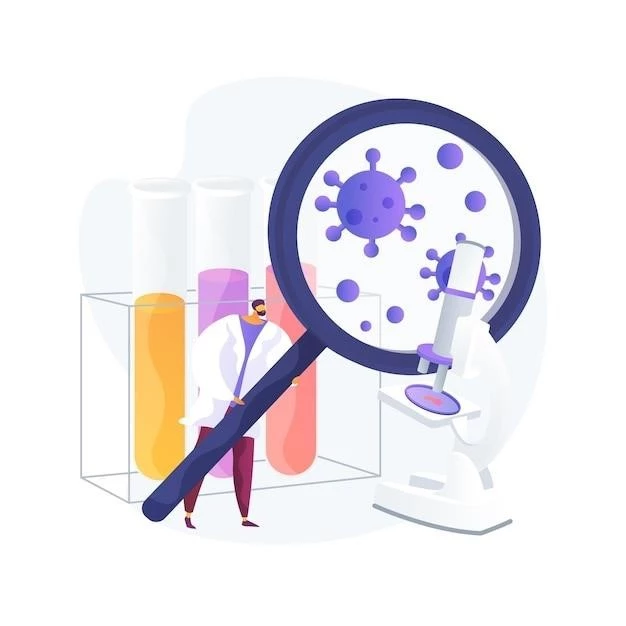Plan⁚ Herpes Viridae Disease
Herpes Viridae diseases are caused by different viruses including HSV-1‚ HSV-2‚ varicella-zoster‚ Epstein-Barr‚ cytomegalovirus. Understanding these infections‚ recognizing symptoms‚ managing outbreaks‚ seeking medical advice‚ and preventive measures are essential steps in dealing with these viruses.
Overview of the Herpes Viridae Family
The Herpes Viridae family comprises several viruses‚ each with its own characteristics. These include HSV-1 (commonly causes oral herpes)‚ HSV-2 (typically responsible for genital herpes)‚ varicella-zoster (causes chickenpox and shingles)‚ Epstein-Barr (associated with infectious mononucleosis)‚ and cytomegalovirus (can lead to severe complications in immunocompromised individuals). Understanding the distinctions between these viruses is crucial for proper management and treatment.

Understanding Herpes Viridae Infections
Herpes Viridae infections are caused by a group of DNA viruses. These viruses can remain dormant in the body after initial infection‚ leading to recurrent outbreaks. Understanding how these viruses replicate‚ establish latent infections‚ and reactivate is crucial in managing the infections effectively. Being aware of the transmission modes and risk factors associated with each virus can help in preventing the spread of infection to others. It is important to stay informed about the different herpes viruses to protect yourself and others from potential infections.
Recognizing Symptoms of Herpes Viridae Infections
Symptoms of Herpes Viridae infections can vary depending on the specific virus involved. Common signs may include fever‚ blisters‚ ulcers‚ itching‚ and fatigue. HSV-1 and HSV-2 often cause cold sores and genital sores‚ respectively. Varicella-zoster presents as chickenpox or shingles. Epstein-Barr virus can lead to swollen lymph nodes and fatigue‚ while cytomegalovirus may cause flu-like symptoms. Prompt recognition of these symptoms is essential for early intervention and management of the infections.
Managing Herpes Viridae Outbreaks
Managing Herpes Viridae outbreaks involves various strategies to alleviate symptoms and prevent transmission. Good hygiene practices‚ such as frequent handwashing‚ can help reduce the spread of the viruses. Using antiviral medications prescribed by healthcare providers can help shorten the duration and severity of outbreaks. Keep the affected areas clean and dry‚ and avoid close contact with others during active outbreaks to minimize transmission risk. Seeking medical advice for personalized management strategies is crucial in effectively managing Herpes Viridae outbreaks.
Treatment Options for Herpes Viridae Infections
When it comes to treating Herpes Viridae infections‚ antiviral medications play a key role. These medications can help alleviate symptoms‚ shorten the duration of outbreaks‚ and reduce the risk of transmission to others. It is essential to follow the prescribed treatment regimen diligently to achieve the best outcomes. In addition to medication‚ maintaining good personal hygiene‚ managing stress levels‚ and adopting a healthy lifestyle can also support the immune system in combating the viruses. Consulting healthcare professionals for personalized treatment plans is recommended to effectively manage Herpes Viridae infections.
Understanding Specific Herpes Viruses
Specific Herpes viruses‚ such as HSV-1‚ HSV-2‚ varicella-zoster‚ Epstein-Barr‚ and cytomegalovirus‚ each have unique characteristics and implications. HSV-1 commonly causes oral herpes‚ while HSV-2 is predominantly responsible for genital herpes. Varicella-zoster can lead to chickenpox and shingles‚ while Epstein-Barr virus is linked to infectious mononucleosis. Cytomegalovirus infections can be severe in individuals with weakened immune systems. Understanding the distinct features of these viruses‚ including their modes of transmission and potential complications‚ is vital in effectively managing and preventing infections.
Preventive Measures for Herpes Viridae Infections
Preventing Herpes Viridae infections involves adopting proactive strategies to reduce the risk of transmission. Practicing safe sex‚ using condoms‚ and avoiding sharing personal items can help prevent the spread of HSV-1 and HSV-2. For varicella-zoster‚ vaccination is key in preventing chickenpox and shingles. Maintaining good hygiene habits‚ such as washing hands regularly‚ can also minimize the risk of contracting Epstein-Barr and cytomegalovirus. Being aware of the specific preventive measures for each virus and incorporating them into daily routines can significantly lower the likelihood of Herpes Viridae infections.
Seeking Medical Advice for Herpes Viridae Infections
Seeking medical advice is crucial if you suspect a Herpes Viridae infection. Healthcare professionals can provide accurate diagnosis‚ recommend appropriate treatment options‚ and offer guidance on managing symptoms. Early intervention can help alleviate discomfort‚ shorten the duration of outbreaks‚ and reduce the risk of transmission to others. Additionally‚ consulting a healthcare provider can help address any concerns or questions you may have about the infection. Remember‚ timely medical advice is key to effectively managing Herpes Viridae infections and promoting overall well-being.
